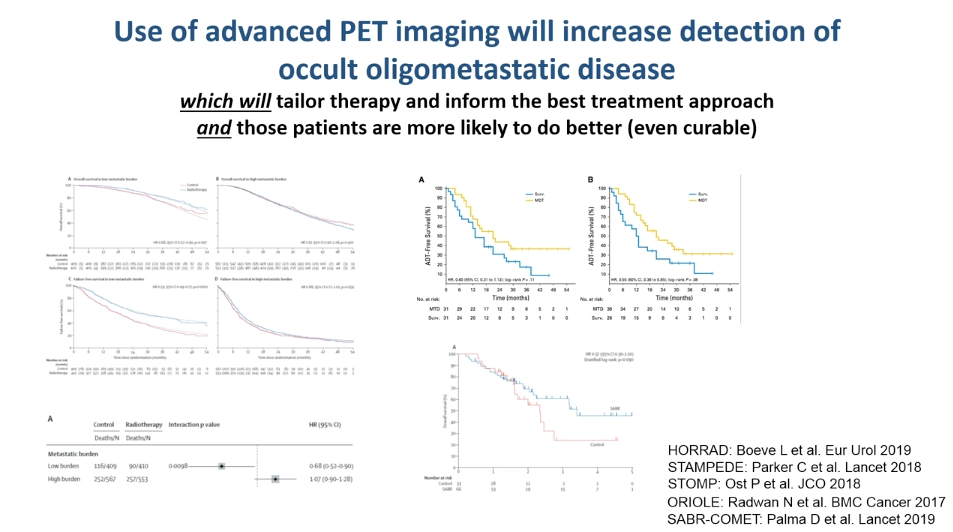Jason Efstathiou, MD, DPhil, presented “Radiation Oncology Perspective on Treatment of Oligometastatic Disease” during the 4th Global Summit on Precision Diagnosis and Treatment of Prostate Cancer on October 3, 2019 in Boston, Massachusetts.
How to cite: Efstathiou, Jason. “Radiation Oncology Perspective on Treatment of Oligometastatic Disease” October 3, 2019. Accessed Jan 2026. https://grandroundsinurology.com/radiation-oncology-perspective-on-treatment-of-oligometastatic-disease/
Radiation Oncology Perspective on Treatment of Oligometastatic Disease – Summary:#
Jason Efstathiou, MD, DPhil, defines oligometastatic prostate cancer and the impact advanced PET/CT imaging has had on the identification of this disease state. He reviews the data deliberating on treatment tailored for these patients in both the primary high-risk and recurrent settings.
Abstract:#
Advances in MRI and PET/CT have provided more sensitive and specific imaging in both the primary high-risk and recurrent prostate cancer settings. PET imaging, in particular, has improved visualization of nodal and distant disease and allowed for the delineation of oligometastatic disease.
Oligometastatic prostate cancer is a disease state on the high-risk/metastatic spectrum, defined as the patient having five or fewer metastatic sites. Advanced PET imaging can identify oligometastatic disease at initial diagnosis and will likely increase the detection of occult oligometastatic disease. However, the questions regarding whether or not tailoring therapy specific to this disease state improves patient outcomes, and whether tailored therapy should entail aggressive local therapy or treating sites of metastases still remain.
Recent studies evaluating aggressive local therapy in newly-diagnosed oligometastatic setting include the HORRAD trial, which found that treating the primary prostatic tumor in patients with bone metastatic disease with radiation does not have an overall survival benefit. However, the STAMPEDE trial found that treatment of the primary tumor specifically in patients with a low metastatic burden may lead to a clinical benefit.
In terms of metastases-directed therapy (MDT), the STOMP trial used the novel endpoint of androgen deprivation therapy-free survival and found that MDT improved this endpoint in oligometastatic patients. While the SABR-COMET trial wasn’t specific to prostate disease, it found an overall survival benefit to MDT in patients with oligometastatic cancers.
In the setting of recurrent oligometastatic disease, questions regarding whether or not to treat the prostate bed, to use systemic therapy alone, or to use MDT remain. Hopefully, future research will inform answers to these questions and provide clarification as to the benefits of tailoring therapy for oligometastatic patients.
About The 4th Global Summit on Precision Diagnosis and Treatment of Prostate Cancer:#
The Global Summit on Precision Diagnosis and Treatment of Prostate Cancer is a multi-day, multi-disciplinary forum designated to informing health care stakeholders about topics including in-vitro fluid and tissue-based molecular diagnostics, novel observation strategies such as active surveillance, and novel therapeutic interventions. Along with this forum’s efforts to form a consensus on the future of prostate diagnostics and precision care, it aims to create an educational and research strategy for its realization. Dr. Efstathiou presented this lecture during the 4th iteration of this Summit in 2019.
ABOUT THE AUTHOR
Jason A. Efstathiou, MD, DPhil, is Professor of Radiation Oncology at Harvard Medical School (HMS) as well as Director of the Genitourinary (GU) Division in the Department of Radiation Oncology and Clinical Co-Director of the Claire and John Bertucci Center for GU Cancers at Massachusetts General Hospital. He is a recognized leader in the fields of GU malignancies and radiation oncology. Dr. Efstathiou holds a BS from Yale University, an MD from Harvard Medical School, and a DPhil from the University of Oxford. He completed his residency training through the Harvard Radiation Oncology Program.
Dr. Efstathiou’s research has informed clinical guidelines and made novel contributions to innovations such as organ preservation therapy for bladder cancer, technology assessment of proton beam therapy for prostate cancer, indications for and adverse effects of androgen deprivation therapy for prostate cancer, improving radiation therapy for testicular cancer, and global oncology outreach efforts.
In addition to his educational work and his patient care, Dr. Efstathiou holds leadership positions within cooperative groups and professional societies

